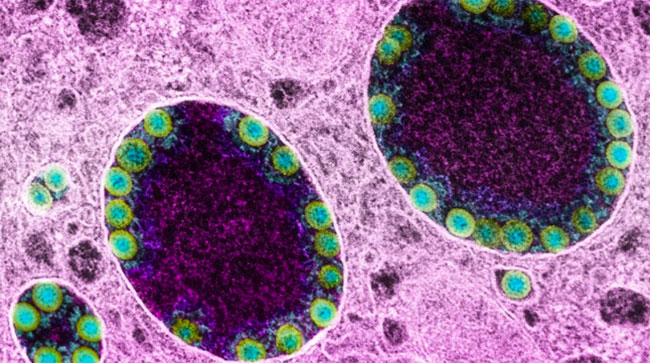On June 27, Professor Phan Trong Lan, Director of the Department of Preventive Health, Ministry of Health, announced that Vietnam has detected the BA.5 subvariant of Omicron.
What is the BA.5 Subvariant?

nCoV sample under a microscope. (Photo: NIAID)
Professor Lan shared this information during a press conference held by the Ministry of Health, but specific details regarding the BA.5 infection case, the time of detection, and epidemiological characteristics have not been disclosed. According to him, the emergence of this new variant was anticipated and is inevitable due to the reopening of economic exchanges and the implementation of a new normal.
The BA.5 variant was first identified in South Africa in January and has since become prevalent in several countries, including Israel and Germany. Some preliminary assessments indicate that BA.4 and BA.5 spread more rapidly than the older variant (BA.2), but there is no evidence of increased severity. Therefore, the Ministry of Health continues to monitor the new variant and information from the World Health Organization (WHO) to adjust and implement appropriate epidemic prevention measures.
The emergence of this new variant comes at a time when Vietnam has recorded 142,000 cases of Covid-19 over the past two months, with a low mortality rate among cases, indicating that the epidemic remains under control.
Globally, the number of Covid-19 cases and deaths is also trending downward; however, experts assess that the epidemic remains complex in some regions, with many countries concerned about a potential new wave of outbreaks in the summer.
The WHO believes that humanity is still in a pandemic phase, and Omicron is not the final variant. Therefore, countries need to continue maintaining vaccination efforts and targeted surveillance…
In agreement, Professor Lan stated that vaccines remain a protective shield for the community, and people need to get vaccinated according to regulations and the correct dosage to combat the epidemic.
Ineffective Treatment Methods
Another pre-print study indicates that even among vaccinated individuals who have received booster shots, treatments using monoclonal antibodies against BA.4 and BA.5 are significantly less effective than against BA.2.12.1. In laboratory tests, researchers noted that only bebtelovimab is capable of combating both BA.2.12.1 and BA.4-5-6.
According to Professor Paul Bieniasz, most antibodies produced today are outdated. Currently, only one treatment developed by Eli Lilly (bebtelovimab) is specifically designed to combat Omicron and shows effectiveness. However, other treatments, such as the antiviral drug Paxlovid, may mitigate severe symptoms caused by Omicron infection.
BA.4 and BA.5 are more easily transmissible, but scientists currently do not know if they have higher virulence or cause more severe illness. However, available data does not indicate this.
What Does the Future Hold for Us?
Omicron infections generate a weaker immune response and seem to wane quickly compared to previous variants. From an immunological perspective, infection with this variant is less likely to protect against infections from other strains, making the risk of reinfection after 3-4 months quite high.
The good news in the current situation is that most reinfected individuals do not suffer severe illness. At least at this point, nCoV has not found a way to completely evade the immune system.
However, the more concerning issue is that each Covid-19 infection carries the risk of complications for patients. They may have to live with a range of symptoms that can persist for months or years. It is still too early to know whether frequent infections with Omicron lead to post-Covid-19 conditions, especially in vaccinated individuals.
Other experts suggest that to keep pace with the virus’s evolution, Covid-19 vaccines should be updated more rapidly, potentially even faster than annual flu vaccines. Virologist Kristian Andersen from the Scripps Research Institute in San Diego, USA, shared: “Every time we think we have overcome the pandemic and are gaining the upper hand against the virus, it comes up with new tricks. We cannot control it by allowing everyone to get infected and hoping for a better outcome.”


















































